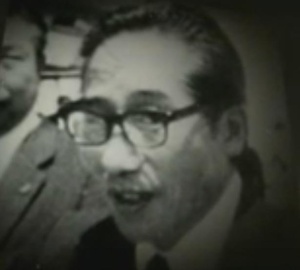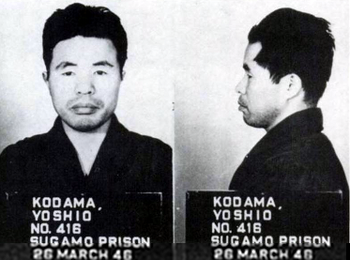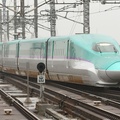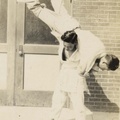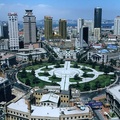Although many Japanese people came to Japan after the legal reform in 1990, they are still not familiar to Japanese people. However, their presence has been seen in various parts of Japanese society since the early Showa period. In this article, I would like to introduce the Japanese people who supported the "masterminds of Japan."
His name was Taro Fukuda. And the man he supported was Yoshio Kodama. Kodama had deep connections with not only many company executives, but also influential members of the Diet and local politicians, and at the same time, he had connections with leaders of right-wing groups and anti-social organizations, so many Japanese people feared Kodama as the "mastermind of Japan."
Fukuda was born in Salt Lake City, Utah in 1916 as a second-generation Japanese American. His parents were immigrants from Hiroshima Prefecture. Fukuda left the United States at a young age and began living in Japan. When he first arrived in Japan, he studied Japanese at Waseda International Academy (now Waseda Hoshien).
In 1939, instead of returning to America, he decided to go to Manchuria, which was considered a "new world" at the time, because he got a job at the Manchuria Telegraph and Telephone Company. However, his life in Manchuria did not last long. In August 1945, while many Japanese were shocked by the dropping of a new type of bomb by the United States, the Red Army (Soviet Army) unilaterally abrogated the Japan-Soviet Neutrality Pact and invaded Manchuria. Fortunately, Fukuda was able to return to Japan that same year.
After Japan lost the war, Fukuda got a job as an interpreter for the occupying forces. At the time, the occupying forces not only employed second-generation Japanese who had been trained in the United States to speak Japanese, but also second-generation Japanese who had been living in Japan before the war. At first, Fukuda worked as an interpreter for high-ranking officers, but when the occupying forces decided to arrest war criminals, he began working as an interpreter for Japanese who had been accused of war criminals. This led to his meeting with Kodama.
Meeting with the "mastermind of Japan"
The occupying forces took Fukuda to Sugamo Prison (Ikebukuro Sunshine City was built on the site of this facility) and introduced him to Kodama. At the time, the occupying forces were arresting political and business leaders in Japanese society one after another on suspicion of war crimes in preparation for the International Military Tribunal for the Far East, which was soon to open. With Fukuda as an interpreter, the occupying forces subjected Kodama, who was suspected of being a Class A war criminal, to severe questioning. At this point, the occupying forces decided not to question Kodama, and he became free. There are various theories about this decision, but one of the reasons is said to be that the US government considered Kodama to be "useful" in its future diplomatic strategy. This gave him a new title: "America's puppet."
At the same time, Kodama began to deepen his friendship with Fukuda, which came as a bolt from the blue for Fukuda. In 1951, Fukuda translated Kodama's book "I am Defeated" into English. The relationship between the two was very close at this time, and Kodama is said to have treated not only Fukuda well, but also his family well.
Meanwhile, Fukuda left the occupying forces in 1948 and founded a publishing company called Romancesha in Tokyo's Ginza district, where he began to distribute mainly American publications to Japan. However, due to continued financial difficulties, the company closed down within a few years. Later, in 1958, he founded Japan Public Relations Inc., an advertising agency that was very rare in Japanese society at the time. In addition to distributing news from America to the Japanese media, the company greatly expanded the scope of its business by acting as a liaison office for American companies to sell their products to Japan.
Fukuda became the confidant of the "mastermind of Japan"
In the late 1960s, the Defense Agency (now the Ministry of Defense) and the Ministry of Finance (now the Ministry of Finance) were in conflict over whether new equipment (patrol aircraft) for the Maritime Self-Defense Force should be produced domestically or imported from Lockheed of the United States.
At this time, the US government, through Kodama, was trying to get the Japan Maritime Self-Defense Force to introduce Lockheed's P3C. Fukuda met with Lockheed officials on Kodama's behalf and negotiated. It is also said that Lockheed gave Kodama a large amount of cash (approximately tens of billions of yen in today's value) as a covert operation to ensure the deal was successful. As a result, the Japan Maritime Self-Defense Force introduced the P3C.
Following the success of the "plot," Lockheed began to want to use Kodama in passenger aircraft deals as well. At the time, Lockheed was facing fierce competition with other companies and was in financial difficulty, so Kodama's presence was extremely important to the company's future. And each time Kodama was used, Fukuda's presence gradually grew.
In 1974, All Nippon Airways (ANA) introduced Lockheed Tristar aircraft. However, the introduction of this aircraft led to the mass media revealing a large-scale corruption scandal. This was the Lockheed Scandal.
In this case, the Japanese prosecutors (Tokyo District Public Prosecutors Office Special Investigation Division) first targeted Kodama. At the same time, they also extended their reach to Kodama's confidant, Fukuda. As it would be difficult to arrest Kodama, who is considered a big shot, the prosecutors decided to first arrest Fukuda, who is considered a confidant, and subject him to rigorous questioning.
However, at the time the case came to light, Fukuda was suffering from a serious liver disease and was hospitalized at Tokyo Women's Medical University Hospital in Shinjuku. His doctor told the prosecutors that he had little time left to live and allowed them to question him about the details of the case under special conditions. He also agreed to be questioned by the prosecutors.
However, the prosecution was not able to get as much results from Fukuda as they had hoped. He was already suffering from illness both physically and mentally, and although he spoke of the general circumstances of the case, he spoke very little about the details or the core of the case. The only thing the prosecution got from him was that he had worked to ensure that Kodama would not suffer any disadvantage in his dealings with Lockheed. Sensing that the prosecution's investigation was coming to light, he is said to have ordered those involved to dispose of large amounts of documents.
In June 1976, Fukuda passed away in his hospital bed, without saying much about the incident. He was 60 years old. Eight years later, Kodama, who was at the center of the controversy, also passed away, without saying much about the incident.
In the Lockheed Scandal, the police arrested former Prime Minister Kakuei Tanaka on July 27, 1976. The arrest of Tanaka, who was called the "Modern Taiko," came as a surprise to many Japanese people. At the same time, his arrest further increased Japanese people's distrust of politics.
What kind of person was Taro Fukuda? There are various opinions, but I think he was one of the Japanese Americans who was at the mercy of Japanese society. There were many Japanese Americans like him who were at the mercy of Japanese society.
Fukuda was one of the Japanese who was greatly at the mercy of Japanese society for many years, through his migration to Manchuria before the war and his relationship with Kodama Yoshio after the war. If he had never met Kodama, he probably would have left his name as a scandal-free businessman not only in postwar Japanese society but also in Japanese American society.
References
1. Hartung, William D. Prophets of War: Lockheed Martin and the Making of the Military-Industrial Complex
2. Naoki Inose, The Lockheed Scandal of the Dead (Bunshun Bunko, 1987)
3. Takemori Hisatomo, The Invisible Government: Kodama Yoshio and His Dark Network (Shiraishi Shoten, 1976)
4. NHK Special "Unsolved Cases Series -- Lockheed Scandal Parts 1-3" (aired in October 2016)
© 2017 Takamichi Go


